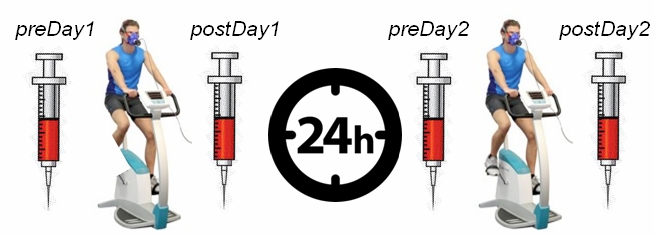Two-Day Cardiopulmonary Exercise Testing

A total of 173 subjects performed two successive Cardiopulmonary Exercise Tests (CPETs) at three different locations (New York City, Los Angeles, and Ithaca, NY) as part of this NIH funded project (U54NS105541). Recruitment and data collection for these subjects has been completed. In addition to the two CPETS, 52 subjects at Weill Cornell Medicine underwent MRI and PET neuroimaging before each CPET.


Clinical Core Co-Director
President, Sustainable Health Systems
Healthy Living and
Exercise Medicine Associates


Human subject participation was coordinated by Dr. Betsy Keller, Ph.D., who has extensive experience in CPET of ME/CFS patients and by Dr. Geoff Moore, an internist with a special interest in the effect of exercise in health and chronic disease. ME/CFS expert physicians Susan Levine and John Chia also participated in the evaluation of subjects and interpretation of medical tests. CPET occurred at Weill Cornell Medicine, at the Ithaca College Wellness Clinic, and in Los Angeles (by the Workwell Foundation).

A hallmark symptom of ME/CFS is post-exertional malaise (PEM), or the exacerbation of a patient’s symptom complex following exertion beyond their unique threshold. A patient’s baseline physiological condition can be examined by an initial CPET, and PEM can be characterized by examining CPET data when the patient repeats the exercise challenge the following day.
Biological samples and clinical data obtained from participants have been banked at Cornell University and indexed into a database. The biological samples are being used to identify changes in the physiological and molecular responses to exercise that occur in ME/CFS in comparison to healthy sedentary controls. By examining patients at baseline and after their symptoms increase, we hope to discover the molecular basis of PEM, one of the most disabling symptoms of ME/CFS. We are also analyzing the abundant physiological data obtained from the CPETs to understand differences in exercise response between sedentary controls and ME/CFS subjects. Two other datasets, one from electronic monitoring and another consisting of symptom questionnaires, are being probed to learn how the two days of exercise tests affects both controls and ME/CFS subjects, and how long is needed for subjects to recover to their baseline condition.
 Center for Enervating NeuroImmune Disease
Center for Enervating NeuroImmune Disease
